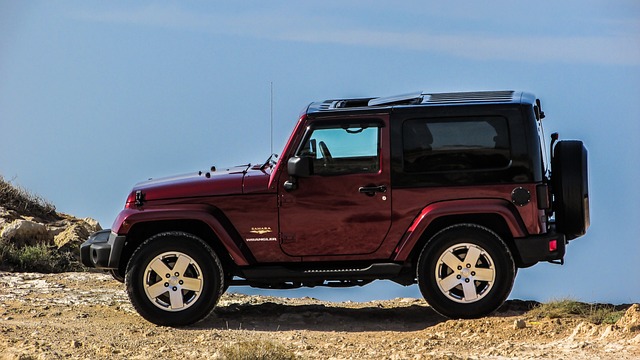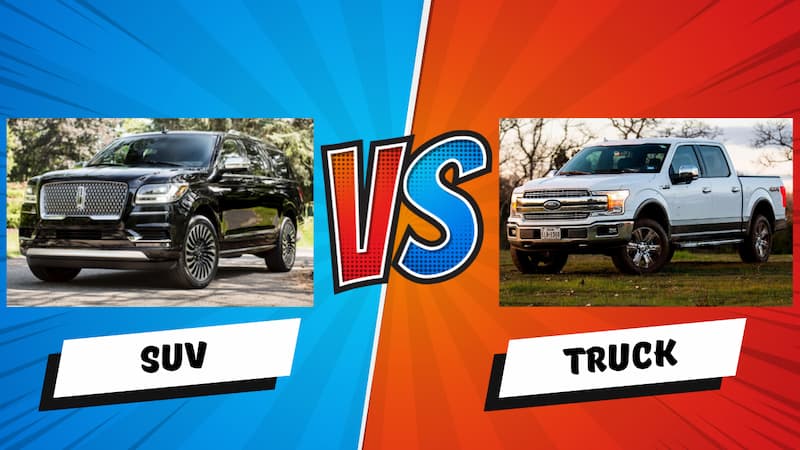In online communities like Reddit and Quora, the debate over “Is An SUV a Truck?” is still generating a lot of discussions. About how the two differ, many people are still unsure. What requirements must a car meet in order to be referred to as a truck?
Due to some similarities between SUVs and trucks, most people refer to them as trucks. However, SUVs and trucks are two distinct species, distinct in appearance and purpose, and both have benefits and drawbacks, which I will cover in this article.
This article will assist you in comprehending the traits of SUVs that apply to trucks and what you should take into consideration when choosing between the two.
What Makes a Vehicle An SUV?
It’s understandable to mistake an SUV for a truck (let’s stick with pickup trucks). After all, an SUV, or Sport/Suburban Utility Vehicle, is a hybrid vehicle by definition. SUVs were created with the intention of fusing the benefits of a pickup truck, a passenger car, and a minivan into a single vehicle. Specifically, to design a vehicle with comfortable ride, plenty of cabin space, impressive off-roading capabilities, and towing capacity.
If an SUV had some qualities of a pickup truck (and vice versa), it wouldn’t be shocking. Nonetheless, here’s a non-exhaustive list of attributes that can help differentiate an SUV from the rest of the vehicle segments:
- High-spec engine
- AWD (All-Wheel Drive) system
- Reduced emissions and better fuel mileage
- High ground clearance
- Longer wheelbase
- Axle articulation
- Off-road-oriented suspension
- Large-diameter tires
- Tallpassenger cabin and seating position
- Locking differentials
- Body-on-frame or unibody construction
- Modern design/styling

Pros of SUV (Vs Truck)
Increase of Seating Capacity
Unlike most cars, SUVs can carry up to 2500 pounds and seat five to seven people comfortably. This many seats would be required, especially if traveling outside, for people with large families. This may also be a deciding factor for those who enjoy having room in their vehicles.
Safety
Compared to cars, trucks, and other vehicles of the same size, SUVs are more robust and easier to drive. People feel more comfortable using an SUV because the seats are higher and it can withstand harsh weather.
Better Maneuverability
Due to the truck’s long and narrow frame, SUVs have a wider turning radius than trucks. With your SUV, you can also travel to wild and unpaved areas. Even in sleet and on icy roads, they can easily get around.
Better Gas Mileage.
Sincemost Trucks are designed for low-end torque, are not speed efficient, and will use more fuel than an SUV. Despite the fact that most trucks and SUVs have similar miles per gallon (mpg) ratings, an SUV will typically have better mileage than a truck. Even smaller SUV models outperform other vehicles in terms of fuel efficiency.
Cons of SUV (Vs Truck)
Price
Depending on their size, SUVs are known to be expensive. It is popular, especially among Americans, because people buy it because they can afford it and appreciate good styling. However, not everyone has a lot of money, and if you buy an SUV, be prepared to pay more because the parts are more expensive than those for standard cars.
The SUV’s weight will put more pressure on its tires and breaks, so always be prepared to replace these parts on a regular basis. A full-sized truck costs about $46,500, while a full-sized SUV like the 2020 Cadillac Escalade will cost more than $60,000.
Harmful Carbon Emissions
SUVs are more fuel-hungry than trucks and produce more carbon emissions, making them less environmentally friendly.
Flipping Dangers
SUVs are more likely to topple over because they are taller. They also have a higher center of gravity than trucks and small cars.
Manufacturers take this into account and incorporate ECS (Electronic Control Stability) into the newer models to reduce risk.
Pickup Trucks Explained
The first pickup trucks, which date back to 1902, were sold with only the chassis attached; bodies were added separately by third parties. The design eventually changed to 3/4 ton and 1-ton carrying trucks with a cab included and a wooden body.
The drivetrain was also enhanced later on, and the cabin was enclosed with windows and a windshield. Although there were many changes, the pickup truck was still primarily used for work or farming.
Consumers didn’t change their usage of these light-duty trucks significantly until General Motors produced pickup variants intended for private ownership in the early 1930s. When end-users began buying these trucks for lifestyle and recreational purposes rather than as a workhorse in the 1950s, this shift in perspective became clear.
The late ’50s saw the rise of “crew cabs” – perhaps one of the first 4-door pickup configurations to be ever mass-produced. Since then, pickup truck concept and design as a whole have exponentially developed, giving rise to the purpose-built behemoths we see on the market today.

Pros of Trucks (Vs SUV)
Stronger Engine Power
The typical SUVs and cars lack the power that truck engines do. They are regarded as the king of the roads because of this. More upgradeable diesel engine choices are available for truck models.
Exterior Bed
Because of this feature, the trucks are adaptable because in addition to having the capacity to store heavy materials, you can still place extended loads like lumber and piling by lowering the tailgate.
Better Towing Performance
The ability of trucks to haul and tow due to their strong engines is one of their key characteristics. Massive powerplants can be easily installed thanks to the body on the frame.
Cons of Trucks ( (Vs SUV) )
Poor Gas Mileage
They use more gasoline than SUVs because they are designed to be workhorses. It is the cost of using a strong engine. They won’t get as much gas mileage as the majority of popular SUVs.
Less Seating Capacity
A small family can only fit inside a truck, and that’s with the front seat occupied. Having truck beds has led to this. Towing capacity will be reduced in exchange for a shorter bed.
Less Maneuverability
Due to their narrow turning radii and propensity to be bigger and wider than SUVs, it can be challenging to find a parking spot.
Pickup Truck Or SUV – Which Should You Buy?
Now that you know the answer to, “is an SUV a truck?” the only thing left is deciding which one you should buy. There are some similarities in the advantages and disadvantages of the two types of vehicles. You’ll make your next important choice based on the functional characteristics that are particular to each and that each has. While that bit is all up to you, here are other facets to consider when comparing pickup trucks to SUVs:
Budget
Your budget is the most crucial factor to consider when buying an SUV, pickup truck, or any other type of vehicle, before any personal preferences. A light-duty pickup costs between $28,000 and $75,000, while compact Japanese SUVs are typically priced between $21,000 and $30,000.
These four-wheelers are expensive due to their large cabins, off-roading, and towing abilities. Having a tough car with all the bells and whistles would be nice. Due to limited funds, many consumers opt to purchase their second choice or a used model.
Application
The next important factor to think about is your intended use for the vehicle, assuming cost is not an issue when choosing your future adventure partner.
Do you do a lot of rock-crawling and ripping in the dunes? For you, full-size pickup trucks are the ideal choice.
Do you only go on road trips around town and to the beach with friends? Then a crew-cab pickup or a small SUV might prove to be a better choice.
Do you work in construction and require a vehicle with an incredibly long bed and a high payload capacity? You’ll get excellent use out of either an extended-length SUV or pickup.
Rider Comfort
When it comes to rider comfort while driving, interiors, valvetrain, technology, and accessories all play a role. Having a vehicle that handles well, has the right gadgets, and doesn’t guzzle gas is essential, especially if you plan to use your four-wheeler more on city streets than on backcountry roads. Additionally, you wouldn’t want to use a truck or SUV that is too large for the narrow city streets. If you frequently travel in groups, you wouldn’t want to be in a truck with an extended cab either.
Mechanical Savvy
This refers to both your skill as a mechanic and your driving prowess. Working in a sizable auto shop requires you to be a qualified mechanic. You cannot, however, own a vehicle as complicated as a pickup truck or a long-bodied SUV and have no troubleshooting skills. It would be wise to choose up to large-size trucks and SUVs if you are an experienced/savant mechanic or a hobbyist mechanic.
A small truck or SUV would be a better choice for new car owners to practice diagnosis and repair on. Unless they have an urgent need for a larger vehicle, that is. The ability to handle minor repairs that people would typically bring to a professional to fix also helps to reduce costs.
Conclusion – Is An SUV a Truck? What’s the Difference?
Whether you’re a nouveau or experienced driver, telling the difference between pickup trucks and Even today, SUVs can be difficult. Hopefully, this information helps to distinguish between the various types of vehicles.
This information should assist you in making the best choice when buying your next car. More importantly, paying close attention to these details will guarantee that you can utilize all of your soon-to-be wheeler’s capabilities.
